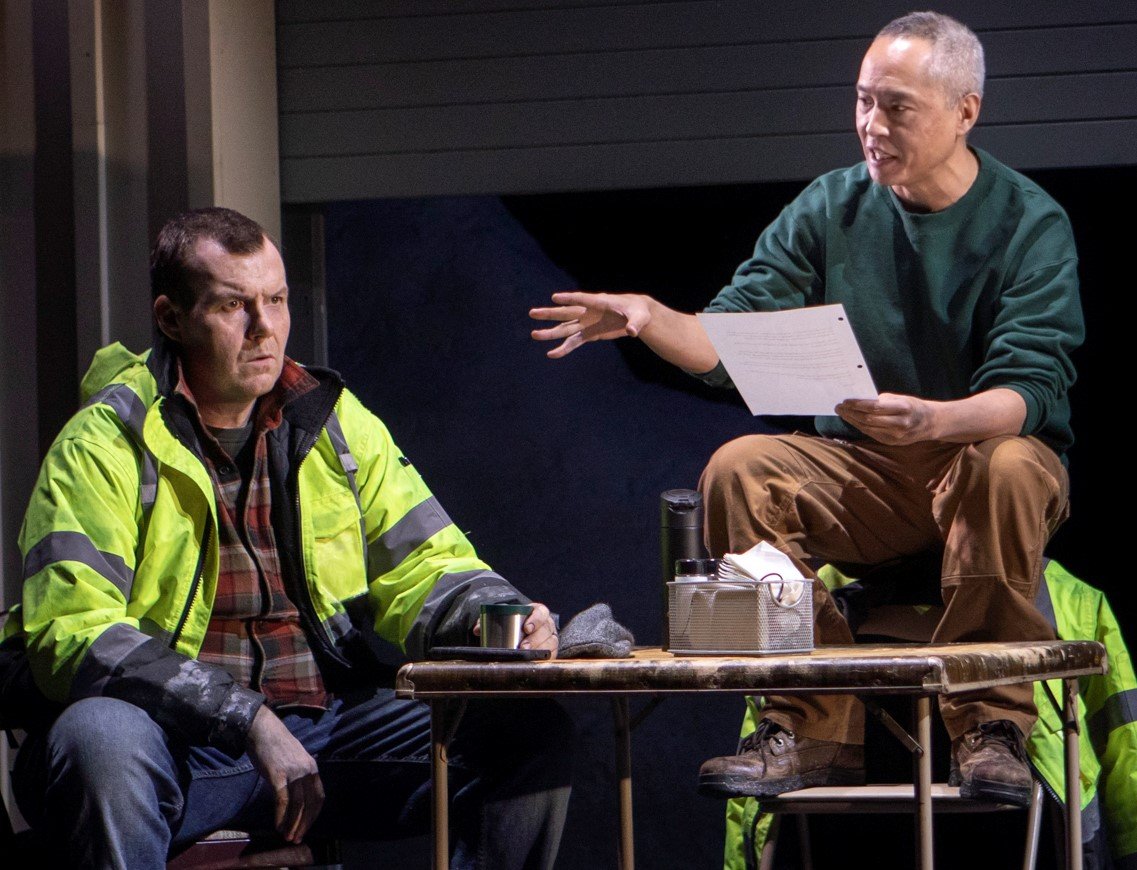From left: Peter (Jeb Kreager), Basil (Ken Leung) and Maiworm (Quincy Tyler Bernstine) in the Evanston salt dome.
In Evanston Salt Costs Climbing, a young woman prone to panic attacks describes her behavior as “spinning out.” That would be an apt term, too, for what the play itself does. Somewhere around the 80-minute mark of the intermissionless 100-minute dramedy, it starts spinning out into surreal antics such as quick replays of the same scene, someone getting pulled underground and appearances by dead people.
Maiworm (Bernstine, left) has a unique bond with her daughter who’s really her stepdaughter, Jane Jr. (Rachel Sachnoff, right).
Not that it ever seems like a traditional drama. In the first scene alone, “Fuck you” is volleyed back and forth between two characters no fewer than 10 times (and they’re friends!) and one of them segues from talking about selling a hot tub to stating “I want to kill myself” without a pause or change in tone. The bizarro goings-on accelerate in the final quarter, but there are mysteries and quirks throughout the play: among them, a Jane Jr. who’s the stepdaughter, not daughter, of Jane; a faceless lady in a flowered dress and wide-brimmed hat; and a nonchalance toward suicidal and homicidal impulses.
Evanston Salt Costs Climbing is the latest work from Will Arbery, whose Heroes of the Fourth Turning was a finalist for the 2020 Pulitzer Prize. For this New Group show, Arbery has reunited with Danya Taymor and Jeb Kreager, director and cast member, respectively, of Heroes’ 2019 production at Playwrights Horizons. Kreager plays Peter, a depressive salt-truck driver in Evanston, Ill., who works alongside a driver named Basil (portrayed by Ken Leung), a Greek immigrant who likes to write fiction.
The linchpin of the story, though, is their supervisor in the Department of Public Works, Jane Maiworm (Quincy Tyler Bernstine), an overly devoted public servant and nerd for the minutiae of her job. Maiworm has problems at work with those climbing salt costs and at home with her anxious daughter, Jane Jr. (Rachel Sachnoff). Almost everything stirs Jane Jr.’s anxieties, from not being married to her favorite pop star, to the threat of environmental catastrophe, to thoughts like these: “We only know about 4 percent of the energy in the universe. Dark energy is everything else. If 96 percent of everything is unknown, does that mean that everything we know about is also 96 percent unknown?”
“It adds up to an imaginative blend of workplace drama, climate-change allegory and existential plaint. ”
During the three winters when the play takes place, Jane Jr. tries to maintain her equilibrium (and, at her mother’s behest, read Jane Jacobs’s The Death and Life of Great American Cities), Peter faces a family crisis, Basil gets a story published, and Maiworm mulls an installation of environmentally friendly road de-icing technology, which would put salt-truck drivers out of work. At least that’s the realism-based action in Evanston Salt Costs Climbing. There’s otherworldly stuff happening too, like Peter’s mysterious ailments, talk of people fusing together, dreams about never getting where you’re going, and a sinister force below ground— “something under everything that’s making us all want to die.”
It adds up to an imaginative blend of workplace drama, climate-change allegory and existential plaint. Well, imaginative or exhaustingly offbeat—one’s perceptions may vary, and they might affect your appreciation for the play. And your assessment of how much Arbery succeeds in making a point about the futility of life and prospects for change—or is it the value of those things he’s emphasizing?
Basil (Leung, right) reads his story to coworker Peter (Kreager, left). Photographs by Monique Carboni.
Whatever Arbery’s point may be, it’s brought to vigorous life by the design team. Matt Saunders’s set is impressive when it’s just the two enormous doors of the salt dome, with some piles of salt in the background. Then the doors open and all four quadrants behind them feature additional settings, including Maiworm’s bedroom and the elevated cab of the salt truck. When Peter and Basil are in the truck, lighting and sound effects (backup beeping, snow crunching, headlights, vehicles skidding) replicate the experience authentically. The lighting, designed by Isabella Byrd, and Mikaal Sulaiman’s sound are also key to the staging of the more fantastical sequences late in the play.
All the actors live comfortably in their roles. Sachnoff, the only holdover from the show’s 2018 regional production, is called on to sing and dance as well. The ever-reliable Bernstine expertly balances Maiworm’s empathetic and eccentric qualities, making her a person who might be too weird and obsessive to love but is too benevolent to dislike. Kreager delivers Peter’s many non sequiturs smoothly, and Leung doesn’t nail the Greek accent but otherwise is effective.
Arbery may try his audience’s patience—Maiworm reads aloud a newspaper article in its entirety three times—but those who enjoy a jumble of naturalism and absurdity that speaks to our real-life angst will leave the theater satisfied.
Evanston Salt Costs Climbing runs through Dec. 18 at the Pershing Square Signature Center (480 W. 42nd St.). Performances are 7:30 p.m. Tuesday–Friday and 8 p.m. Saturday, with 2 p.m. matinees Saturday and Sunday. For tickets, visit thenewgroup.org.





